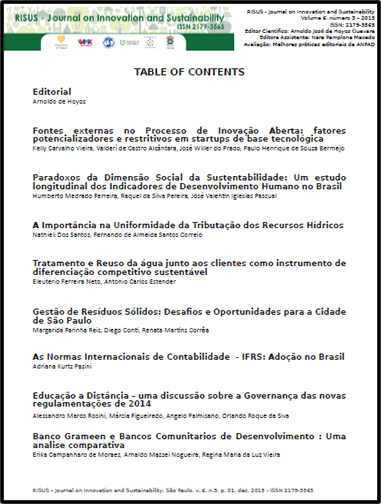Solid Waste Management: Challenges and Opportunities for the City of Sao Paulo
DOI:
https://doi.org/10.24212/2179-3565.2015v6i3p77-96Palabras clave:
Solid Waste Management, National Policy on Solid Waste, Selective CollectionResumen
This paper is a study of the Selective Waste Collection System at the city of Sao Paulo, Brazil. Sao Paulo is the largest city in Latin America and one of the world´s largest, with a population of over 11 million people. However, although being an economic reference and having the largest industrial park and financial center of the country, selective waste collection and recycling reaches only 46% of households, that represent only about 2.6% of the waste collected in the city, and yet even this is very mixed with waste. Disposal of solid waste causes significant environmental impact, and its known that poor solid waste city management have major impact on health and on the local and global environment due to the physical pollution of soil, water and polluting emissions generated by the release of harmful gases; moreover there is an addition to the significant increased economic costs in handling such waste that were not treated properly from the beginning. The lack of Waste Management has a great impact regarding the pollution of soil and air factors, becoming one of the main causes of flooding due to lack of collection and inadequate disposal in soils and waters. This paper is a study of Solid Waste Management at the city of Sao Paulo, following regional and national objectives. By checking all the logistics of the process, it was possible to identify steps and actors that contribute to 2.6% of recycled materials in the city, of possible 35%. Finally five players of the system from different areas were interviewed that describe challenges and opportunities of the selective collection system that may end up bringing benefits to the city.Descargas
Publicado
2015-03-15
Número
Sección
Papers
Licencia
This Journal is licensed under a Creative Commons Attribution-Non Commercial-No Derivers 4.0 International license.
1.The author (s) authorize the publication of the article in the journal;
2.The author (s) warrant that the contribution is original and unpublished and is not in the process of being evaluated in other journal (s);
3. The journal is not responsible for the opinions, ideas and concepts emitted in the texts, as they are the sole responsibility of its author (s);
4. The editors are entitled to make textual adjustments and to adapt the articles to the standards of publication.


